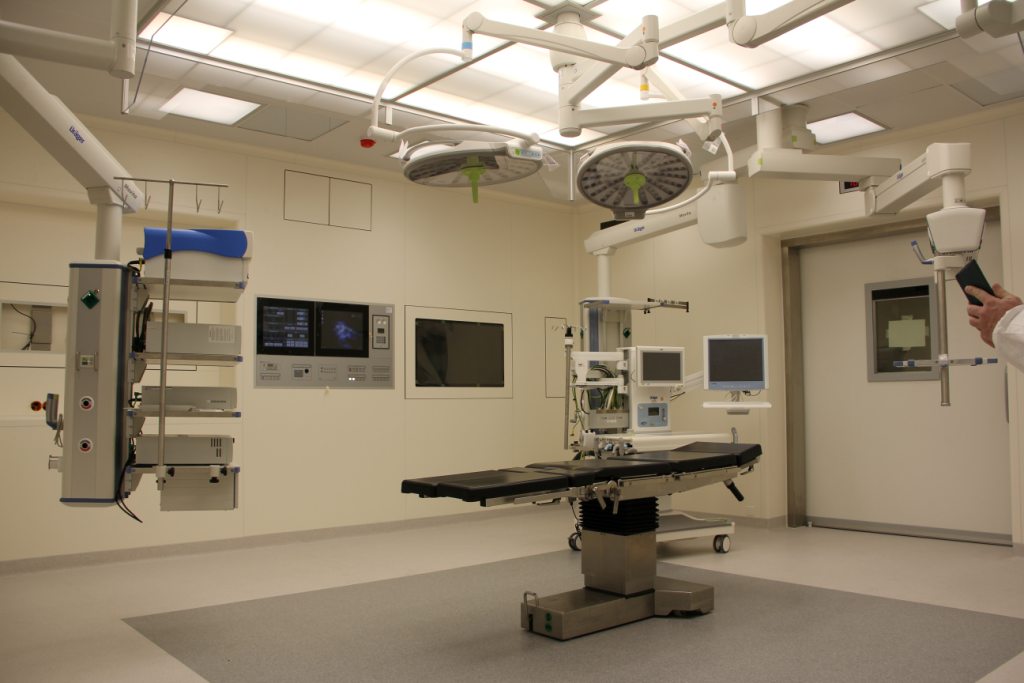


The first step to getting relief from pain is visiting a pain control clinic. These clinics are staffed by physicians who assess the cause and severity of pain, then prescribe a treatment plan. Doctors will review your medical history and physical condition, as well as diagnostic tests and medications you have taken. They may also call you to schedule follow-up visits. Most pain control clinics offer consultations. You can make an appointment with one of them, or you can request an appointment online.Patients can also visit a pain control clinic for counseling and education.
They will evaluate a patient's medical history and perform a comprehensive physical exam. Patients may also be asked to keep a pain diary. The goal of pain management is to return the patient to a normal life, but proper treatment is the key to a successful recovery. Pain control clinics also offer counseling and support groups to help patients cope with chronic pain. The most important step in the treatment process is determining the source of the pain.While it may seem intimidating to seek treatment from a pain control clinic, a good one will offer a wide range of treatments for chronic pain.
During treatment, doctors will educate you about the causes of pain and suggest ways to manage the symptoms. A well-run pain control clinic will have an experienced team of doctors that will treat your condition and provide you with a comprehensive pain management plan. This will allow you to return to work sooner.A pain control clinic can integrate into a multiphysician primary care practice. Pain specialists will work closely with other physicians, and the staff of a pain control clinic will be required to coordinate daily with them. As with any type of medical practice, the main goal of a Pain Control Clinic is to improve the patient's quality of life and decrease the severity of their pain.
By addressing your pain, you'll be able to take advantage of every treatment option available.In addition to providing pain medication, the staff at a pain control clinic may offer psychosocial services to patients. Psychosocial services may include psychotherapy, education about pain management and preventative techniques. They may also offer exercise classes and counseling. If these options don't seem to be working, pain control clinics may offer alternative treatments to reduce the severity of the pain.
A good pain control clinic will have a concierge service that will help you find the best treatment for your condition.A Pain control clinic should be staffed with a board-certified physician and a multidisciplinary team of professionals. A pain control clinic may also refer you to other specialists, if necessary. A good pain control clinic should be well-equipped to deal with even the most complex cases of pain. There should be strict protocols in place to prevent stealing and abuse of medication. Once you've found a good pain control clinic, they may even call you to schedule a follow-up appointment.

A pain control clinic specializes in reducing pain and minimizing its side effects. These clinics may include physicians with different specialties, including occupational therapists, psychologists, and physical medicine doctors. Some clinics also collaborate with primary care physicians. However, there are several downsides to pain control clinics. Patients often must wait a long time to get approved by insurance companies, face a fight to get necessary tests, and risk of the side effects and addiction.Regenerative treatments are another alternative for chronic pain conditions. These therapies use biological substances to repair damaged tissues and stimulate healing. These treatments can be performed for both acute and chronic conditions.
In many cases, patients are able to return to regular activities within a few days after undergoing treatment. The clinic also offers many other options, such as biologic therapies, which involve the use of biological substances. Regenerative treatments are highly effective for many types of pain and can help patients live a fuller life.Most pain control clinics accept insurance and offer financing for out-of-pocket costs. Those without insurance may be able to pay for their services with cash, credit cards, or even a bank loan. If payment is an issue, patients should ask the clinic's customer service staff about payment options and if they accept financing. Also, remember that some pain control clinics offer same-day appointments or in-patient services. It is important to research the clinics' reputation before committing to them.
A pain control clinic's staff is trained and experienced, which gives patients the confidence that their care will be of high quality. Many clinics offer same-day appointments, while others require additional information and require an appointment. While some clinics offer limited hours and do not accept emergency calls, many others offer extensive outpatient services for patients. However, patients should inquire about waiting times and whether the clinic offers special protocols for minor injuries. Most of these clinics will provide excellent pain control and are worth a visit.A physician at a pain control clinic will probably be a general practitioner or a physician's assistant. The physician will perform a physical exam and interview the patient about their medical history. He or she will assess the level of pain and order diagnostic tests to confirm the diagnosis.
The physician will also consider the social and family history of the patient to determine the appropriate treatment. He or she may also recommend exercises or pain management help manage the pain.The staff of a pain-control clinic includes clinical social workers, registered nurses, and psychologists. They will review patients' medical histories and evaluate the severity of their condition. The physicians will recommend lifestyle changes to help reduce pain and improve their quality of life. In addition, the clinic's counselors will help patients understand how to manage pain and how to avoid harmful habits. Those who undergo treatments at a pain control clinic are often happier and more active as well.

The pain control clinic concept began when the CEO and chief medical officer of the practice, the burden of untreated pain on emergency departments. The pain specialist was not happy with the treatment of patients in these emergency rooms because it took longer and added additional stress to the provider. Additionally, the level of comfort with the pain treatments varied widely among providers. The clinic employs highly trained medical professionals and concierge services. Patients can expect improved quality of life and function with treatment protocols designed specifically for their needs. Biologic therapies treat the source of the pain rather than masking its symptoms. The doctors at the Pain Control Clinic take great interest in the patient's medical history and conduct all required tests.
They are also happy to discuss any underlying medical issues that are preventing treatment. This way, patients can receive the most appropriate care.Another pain control clinic is QC Kinetix. This clinic offers natural treatments to relieve joint pain. Using regenerative medicine, these treatments can restore body tissues, which will reduce pain and improve your overall well-being. Patients seeking a permanent solution should visit this clinic. Further, the clinic offers a variety of programs to improve the condition of musculoskeletal joints.
QC Kinetix is also affiliated with Pro-Football Legend .When it comes to choosing a pain medicine, the doctor will determine the proper dosage and adjust it accordingly. If you are taking an antidepressant or other prescription drug, bring your list of medications to each visit. Pain medicine does not work as well as prescribed by a physician for the same condition. A doctor may want to switch to another type of medication, or give you more of the same type. In this case, you should go to a different pain control clinic, or consult with a different physician.
Another important thing to remember when choosing a pain control clinic is to be honest with your physician. A patient will have a different level of pain than someone else with the same cancer. Therefore, it is important to tell your doctor if you are experiencing pain during everyday activities, or if you have unusual bowel or skin changes. Ultimately, you should choose the pain control plan that works for you. After all, everyone's body is different.

A pain control clinic can be an excellent resource for anyone who suffers from chronic pain. Whether you're seeking a pain killer or want to learn more about treatment options, these clinics are an excellent resource. The experts at a pain control clinic can offer you treatment for your pain problem that works with your lifestyle. By focusing on pain control, patients can live a healthier life. Listed below are some tips for choosing a pain control clinic.
The staff at a Pain control clinic is highly trained and experienced. Patients can expect a concierge level of service that helps them plan their treatment. The clinic uses regenerative therapies to help the body heal itself and reduce pain and inflammation. The doctors at a pain control clinic are keen to learn about a patient's medical history and conduct all necessary tests before providing treatment. This ensures that they are able to provide the best possible care for each patient.
QC Kinetix is an excellent choice for those in need of joint pain treatment. QC Kinetix uses natural therapies to target the cause of joint pain. Joint pain can reduce mobility, limit function, and ultimately affect your quality of life. QC Kinetix provides in treating joint pain caused by accidents or sports-related injuries. This clinic also treats people who have suffered a musculoskeletal injury and want to recover as quickly as possible.
A pain control clinic can help you live a life free of pain. There are many options for pain control, including telehealth, in-person visits. Most insurances are accepted by these clinics. They also offer convenient appointments and accept Medicare, Medicaid, and other insurances. There is no need to be embarrassed to seek treatment for chronic pain. They are here to help you live a fulfilling life. When you are dealing with chronic pain, a pain control clinic can help you find the best option for your treatment.
Exercise can be a vital part of managing chronic pain. Often, pain patients are fearful of exercise and avoid physical activity altogether. A pain control clinic can help with this fear by incorporating it into a patient's treatment plan. Some pain clinics offer exercises classes where patients can learn exercise methods, such as yoga and stretching. This can be helpful in many ways, including improving posture and boosting the overall health of the patient.
There are two types of pain control clinics: inpatient and outpatient. Outpatient pain clinics are more commonly used. Patients can go every other week or every day, while inpatient pain clinics require a hospital stay of three to four weeks. The doctors at these clinics provides in pain control, but should not be confused about the two. The main difference is that patients can seek care from different medical providers for a wide range of symptoms.
An initial appointment at a pain control clinic can involve a physical exam, an interview regarding your medical history, and a physical examination. The doctor may also use previous diagnostic tests and imaging to determine your condition. A good pain control clinic will spend equal time looking at your medical, social, and family history. A good doctor will also ask you questions about the intensity and location of your pain and your symptoms. Pain may be characterized as a burning, stinging, or pulsating sensation.
When it comes to a physical examination, your doctor will move parts of your body and feel for any swelling. The doctor will also ask you questions about your pain and symptoms and look for other physical problems, such as depression, anxiety, and fatigue. He may also need to modify your pain control plan to address these concerns. This is an important part of pain control. You should seek the advice of a pain control clinic as soon as possible. You should also be willing to make changes as needed to manage your pain.

When choosing a pain control clinic, there are a few things to consider. While some clinics use simple physical examinations, others will perform imaging tests and diagnostic procedures. An ideal clinic will take the patient's social and medical history into consideration. While general medical doctors can treat many types of pain, intervention physicians provides in treating specific physical structures. Multidisciplinary teams of doctors provides in pain control and provide the most pain control treatments. The doctors at a pain control clinic will assess the patient's symptoms and suggest treatment options based on their findings.
Patients should be prepared for a lengthy stay in a pain control clinic. Inpatient clinics require a longer stay at the hospital and may involve visits several times a day. Patients may spend one to two hours in each visit, depending on the type of pain they're experiencing. Patients should also be prepared to fight for medication, appointments, and diagnostic tests. Although the benefits of these clinics are clear, patients should consider their financial situation before choosing a clinic.
Patients may also benefit from group therapies. These sessions may involve sitting in a classroom or circle and talking about their feelings. During these sessions, they may be encouraged to guide one another. Finding support among others is valuable, and it can help patients cope with their pain. Group therapy sessions may also include lectures by experts in the field. They may provide information about pain science, as well as exercises designed to relieve pain.
QC Kinetix is an advanced pain control clinic that uses biologic therapies to treat various conditions. Their goal is to regenerate damaged tissue and reduce or eliminate the patient's pain. Patients who receive treatments at QC Kinetix report reduced pain and a faster return to normal activities. The clinic's noninvasive techniques and innovative technology allow patients to return to their normal lifestyles quickly. There are a number of benefits to this treatment, but it is not for everyone.
Peripheral nerve stimulation is another pain control option. This technique works by delivering an electrical current to specific nerves, providing pain relief. These devices can be placed on the affected areas without the need for surgery. These treatments are free of prescription drugs and can be habit-forming. Patients should consider the risks of this treatment, which include addiction. These machines may be habit-forming and should only be considered when an alternative option is available.
A good pain control clinic will discuss their treatment options with you. Your doctor will look at your medical history and the medications you take. He or she may also order diagnostic tests. The doctor will also examine your physical structure. Your pain journal can help you identify patterns in your pain. They will also discuss your condition with a multidisciplinary team. This can ensure that you'll receive the best care possible. If your pain has gotten worse over time, your doctor may suggest alternative treatment options.
When a patient visits a pain control clinic, a doctor will perform a thorough physical exam. Your pain control clinic physician will examine your condition and evaluate the medications and diagnostic tests you've taken. You'll also be given recommendations regarding pain control and how they may help you increase your daily functioning. After the initial visit, the pain control clinic will continue to monitor your progress and provide you with exercises to do at home. If you decide to go to a pain control clinic, you'll have a doctor who will treat your pain properly.
Some treatments for chronic pain can include biofeedback and cognitive behavioral therapy. Chronic pain can lead to depression and anxiety, and your pain control clinic may recommend counseling or meditation. A patient's pain diary can be useful in planning treatments. Exercise may also reduce pain and improve your posture. Additionally, exercise can improve your mental health and reduce stress levels. A pain control clinic can help you to achieve a healthy lifestyle by getting you moving and exercising regularly.
It's also important to follow the rules set by a pain control clinic. These guidelines are very strict and a violation could result in your doctor's license being suspended or even criminal prosecution. As a patient, you must read your contract carefully to make sure your doctor and pharmacist are on the same page. Your medications, particularly opioids, must be protected at all times. You must also be sure to have a place to store your medications.

In a pain control clinic, a medical professional will evaluate the patient's symptoms, assess his or her overall health, and recommend appropriate treatments. A physical examination, which may include touching the body and moving different parts, is also common. The doctor will ask the patient questions about the cause of his or her pain and look for swelling or other symptoms. During an examination, the patient will be encouraged to participate in group therapy and may receive exercises and lectures to practice at home.
The initial appointment at a pain control clinic may involve a physical examination, imaging, or diagnostic tests. The ideal clinic takes into account the patient's medical and social history. The pain control team will consist of general medical doctors with broad knowledge of the human body and intervention doctors who provides in physical structures. The physicians in a pain control clinic will be skilled in treating a variety of pain problems and will work closely with their patients to develop a treatment plan.
A pain control clinic offers a variety of treatment options, including medication and psychosocial counseling. They may also have psychologists or certified nurse practitioners on staff. Depending on the nature of the condition, pain control clinics may also offer educational programs that educate patients about managing their pain. Pain control clinics are a great resource for people suffering from chronic pain. You might never even know that there is a clinic near you. With the right treatment, you can enjoy an improved quality of life.
Another type of pain control clinic is QC Kinetix. Patients who undergo this treatment at this clinic report significant improvements in their quality of life and reduced pain. The clinic's noninvasive treatments and advanced technology allow patients to quickly return to their daily activities. There are no invasive procedures to undergo and a high success rate is possible. Most patients have minimal side effects, so they're usually able to enjoy their daily activities and lead a more normal life.
If you're considering surgery but don't want to go through the risk, you can also try peripheral nerve stimulation. This pain-relief treatment uses electrical current to target specific nerves. This procedure is not addictive, but it may cause habituation. You must consult your health care provider to discuss your options. During your consultation, ask about all treatments and their side effects. Your doctor may prescribe a specific medication or recommend other treatments to help you manage your pain.
Your doctor will likely ask you several questions about your pain and medical history. He or she will also conduct a physical examination. A good multi-specialty pain clinic will pay equal attention to your medical history, your family history, and your social history. General medical doctors generally have broad knowledge of health and medicine while intervention doctors focus on specific physical structures. Once your first appointment has been completed, your doctor may call you to schedule your next appointment.
The rules for pain control clinics are stringent. Any violations may result in losing the medical license of the clinic or criminal prosecution. Patients must carefully read their contracts and avoid signing up for treatment without knowing these rules. Further, they should be sure to protect their medications at all times. Opioids should be kept under lock and key. This can prevent theft and misuse. So, be sure to check the terms of the pain control clinic before you sign one.
In general, a pain control clinic will provide treatment for people with severe pain. Their doctors will focus on assessing the severity of the pain and working to manage it. The staff of the clinic consists of several different medical professionals with providesd knowledge in different fields. While some clinics focus on specific types of pain, most are interdisciplinary and take a holistic approach. It is important to choose the right clinic for your specific needs and circumstances.
Member Spotlight
QC Kinetix (Riverside Parkway)
9716 Riverside Pkwy, Suite 101
Tulsa, OK 74137
(918) 990-9200
https://qckinetix.com/tulsa/riverside-pkwy/
https://goo.gl/maps/2DfaMmjmejueu3Ds7
Tulsa regenerative medicine is a promising treatment for orthopedic conditions that use the body's own healing abilities. It uses natural processes to restore normal function, which can often be life-changing.
If you're looking for a new job in the area, consider a career in Tulsa Sports medicine. In Tulsa, served as associate director for sports medicine for four years, working with football and women's golf.
If you're looking for top-quality Tulsa sports medicine, look no further than our team of medical practitioners at QC Kinetix (Riverside Parkway). We provide the best possible care for athletes of all levels, from high school students to professional athletes. Our services include professional diagnosis and treatment for common injuries.
Pain Control Clinic Business Network provides a variety of treatment options to patients. A Pain control clinic should be able to provide the right treatment. A clinic that provides in this field should have a multidisciplinary approach. Using a multidisciplinary approach at the Clinic will ensure that you get the best results possible. Depending on the nature of your problem, a pain control clinic will tailor treatments to meet your specific needs.